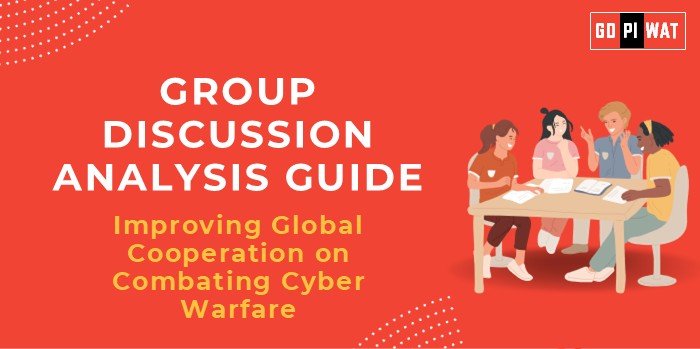📋 Group Discussion (GD) Analysis Guide: Improving Global Cooperation on Combating Cyber Warfare
🌐 Introduction
Cyber warfare is a growing global threat, targeting critical infrastructure and national security. As the frequency and sophistication of cyberattacks increase, nations must prioritize collective action to mitigate risks and ensure digital safety worldwide.
📊 Quick Facts & Key Statistics
- 💰 Global Cybercrime Costs: Projected to reach $10.5 trillion annually by 2025, a 300% increase since 2015.
- ⏱️ Attack Frequency: A cyberattack occurs every 39 seconds globally, with 20% targeting governments and defense systems in 2023.
- 🏥 Critical Infrastructure Targets: Over 70% of cyberattacks in 2022 targeted energy, healthcare, and banking, causing $5 billion in losses.
- 🌍 Global Cooperation Efforts: As of 2023, 84 countries have signed the Budapest Convention, but compliance remains below 50%.
🤝 Stakeholders and Their Roles
- 🏛️ Governments: Create international treaties, fund cybersecurity infrastructure, and share threat intelligence.
- 💻 Private Sector: Develop cybersecurity tools, detect threats, and build resilient systems.
- 🌐 International Organizations: Advocate for global treaties and enforce compliance, e.g., Budapest Convention.
- 📚 Academia and Research Institutes: Innovate in cybersecurity technology and study evolving cyber threats.
- 👥 Citizens: Adopt safe digital practices and resist disinformation campaigns.
📚 Achievements and Challenges
🏆 Achievements
- ✅ Budapest Convention Expansion: 84 signatories as of 2023, showcasing increasing global recognition of the treaty.
- 🤝 Public-Private Partnerships: Companies like Google and Microsoft collaborate with governments to combat cyber threats.
- 🌐 NATO’s Cyber Defense Initiatives: Establishment of cooperative mechanisms like the Cyber Defence Centre of Excellence.
⚠️ Challenges
- 📜 Fragmented Legal Frameworks: Compliance with global treaties remains below 50%, weakening collective action.
- ⚖️ Resource Disparities: Developing countries struggle to invest in robust cybersecurity measures.
- 🔍 Attribution and Enforcement Issues: Identifying perpetrators of cyberattacks remains a significant hurdle.
💡 Effective Discussion Approaches
📜 Opening Approaches
- 📊 Highlight Urgency: “With cyberattacks occurring every 39 seconds globally, cooperation is critical to prevent widespread disruption.”
- 💰 Use Impactful Statistics: “Cybercrime costs are expected to reach $10.5 trillion by 2025, underscoring the economic imperative for global action.”
🔄 Counter-Argument Handling
- 🤝 Address mistrust with confidence-building measures, such as joint drills or transparent data sharing.
- 🌟 Highlight successful models like Estonia’s cyber defense to emphasize potential pathways for cooperation.
📊 Strategic Analysis of Strengths & Weaknesses
- 🌟 Strengths:
- Growing awareness of cybersecurity threats.
- Advanced technology for threat detection.
- Existing frameworks like the Budapest Convention.
- ⚠️ Weaknesses:
- Lack of compliance with existing treaties.
- Resource inequities among nations.
- Geopolitical mistrust hindering collaboration.
- ✨ Opportunities:
- AI-enhanced threat detection systems.
- Expanding international cooperation through new treaties.
- ⚡ Threats:
- Civil infrastructure vulnerabilities.
- Cyber arms races and state-sponsored attacks.
🗣️ Structured Arguments for Discussion
- 👍 Supporting Stance: “Global frameworks like the Budapest Convention prove the feasibility of cooperation in cybersecurity.”
- 👎 Opposing Stance: “Diverging national interests and mistrust hinder effective international collaboration.”
- ⚖️ Balanced Perspective: “While frameworks exist, equitable resource distribution and enhanced trust are needed for sustainable global efforts.”
🎓 Connecting with B-School Applications
- 📘 Real-World Applications:
- Highlights strategic thinking, risk management, and leadership in a digital economy.
- ❓ Sample Questions:
- “How can international treaties address resource disparities in cybersecurity?”
- “What role can private companies play in combating cyber warfare?”
- 📖 Insights for Students:
- Strategic leadership in digital transformation and global policymaking.


